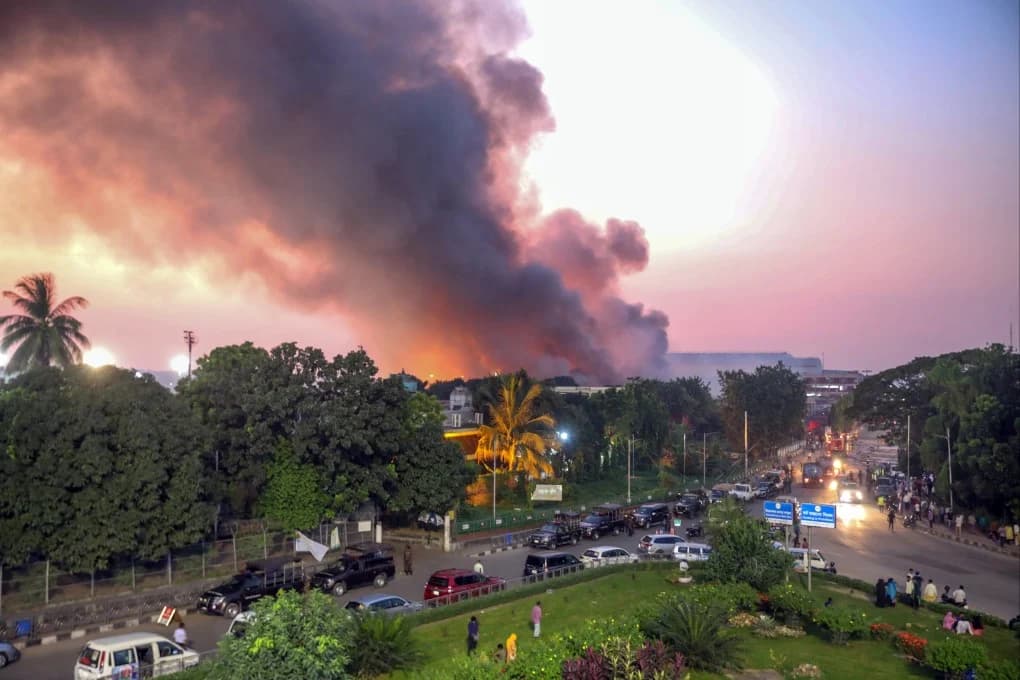We're loading the full news article for you. This includes the article content, images, author information, and related articles.
A massive fire at Hazrat Shahjalal International Airport's cargo complex in Dhaka has raised fears of significant financial losses, potentially exceeding $1 billion, for Bangladesh's crucial garment export sector and other businesses.

A major fire that erupted on Saturday, October 18, 2025, at the cargo village of Hazrat Shahjalal International Airport in Dhaka, Bangladesh, has caused an estimated loss of up to $1 billion (approximately KSh 147 billion) for businesses, particularly impacting the country's vital garment industry. The inferno, which took 27 hours to fully extinguish, forced a temporary suspension of flights and airport operations, leading to widespread concern among traders and exporters.
The blaze, which reportedly started around 2:30 PM EAT on Saturday, October 18, 2025, severely damaged the import storage area of the cargo complex. This section housed critical goods, including fabrics, garment accessories, pharmaceuticals, chemicals, and essential samples for securing new business orders.
Bangladesh is the world's second-largest exporter of ready-made garments (RMG) after China, with the sector generating approximately $40 billion (KSh 5.88 trillion) annually and accounting for over 80% of the country's total export earnings. The fire's impact on this crucial industry is therefore substantial. Inamul Haq Khan, Senior Vice-President of the Bangladesh Garment Manufacturers and Exporters Association (BGMEA), stated that the destruction of essential samples could lead to affected businesses losing out on future opportunities.
The International Air Express Association of Bangladesh has indicated that the broader economic consequences, including shipment delays, increased transport costs, and potential order cancellations, could push total trade losses beyond $1 billion. While the export section of the cargo village remained unaffected, the damage to the import area is expected to have a ripple effect on production and supply chains.
The cause of the fire is currently under investigation by the Bangladeshi government, with authorities looking into every aspect, including possible culpability and arson. This incident marks the third major fire in Bangladesh within a week, raising concerns about industrial safety and infrastructure resilience. Previous fires included one at an eight-storey factory building in the Chittagong Export Processing Zone and another at a garment factory and chemical warehouse in Dhaka, which tragically killed 16 workers.
In response to the crisis, the government has waived all fees for non-scheduled flights for three days and instructed airport authorities to operate the cargo village 24 hours a day, including weekends, to minimise trade disruptions. Food and accommodation were also arranged for stranded passengers.
BGMEA has initiated an assessment of the losses, requesting its members to submit lists of damaged goods and establishing an online portal for rapid information collection. A coordination meeting with airport authorities, the Ministry of Civil Aviation and Tourism, Customs, and other relevant agencies is planned to address the aftermath.
The incident underscores the need for enhanced safety measures and robust contingency plans within Bangladesh's critical logistics hubs, especially given the country's reliance on its export-oriented industries. The pre-Christmas rush, a peak season for cargo, makes the timing of this fire particularly challenging for businesses.
The ongoing investigation into the fire's cause, the government's support measures for affected businesses, and the long-term implications for Bangladesh's export sector will be key areas to monitor. The effectiveness of the implemented contingency plans and any policy changes regarding industrial safety at critical infrastructure points will also be crucial.
Keep the conversation in one place—threads here stay linked to the story and in the forums.
Sign in to start a discussion
Start a conversation about this story and keep it linked here.
Other hot threads
E-sports and Gaming Community in Kenya
Active 9 months ago
The Role of Technology in Modern Agriculture (AgriTech)
Active 9 months ago
Popular Recreational Activities Across Counties
Active 9 months ago
Investing in Youth Sports Development Programs
Active 9 months ago